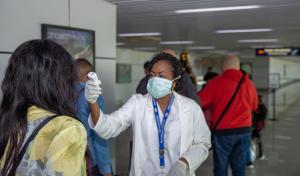WHO urges caution as countries in Africa ease lockdowns
Brazzaville – Three months after the first case of COVID-19 was detected in sub-Saharan Africa, the region has made progress in tackling the virus. Many countries implemented lockdowns and key public health measures early and these appear to have helped slow down the spread of the disease. However, there are concerns that if these measures are relaxed too quickly, COVID-19 cases could start increasing rapidly.
Thirteen countries in sub-Saharan Africa implemented lockdowns along with other public health and social measures nation-wide, while ten more instigated partial lockdowns in hotspots. Preliminary analysis by the World Health Organization (WHO) found that the doubling time – the number of days for case numbers to double in a given country – increased during the lockdown period in most of the countries of the region. (5 days to 41 in Cote d’Ivoire, 3 days to 14 in South Africa). Seychelles started implementing public health and social measures before the notification of its first confirmed cases and seven weeks have passed since its last reported case.
“Three months since the first case of COVID-19 was reported in sub-Saharan Africa, it appears that the swift actions taken by African leaders and communities has slowed the spread of the virus,” said Dr. Matshidiso Moeti, WHO Regional Director for Africa. “These actions came at great social and economic cost, particularly for the most vulnerable and there is an understandable push to lift the measures as rapidly as they were implemented. However, WHO urges countries to follow a step by step approach.”
So far, a number of countries have begun easing their lockdowns, and according to WHO’s initial analysis, the impact on doubling time appears to be varying depending on the timing and duration of the confinement measures. For example, Burkina Faso started implementing a partial lockdown of 17 days after the notification of its first confirmed case and recorded an increase in number of cases during the lockdown period by 253%. The confinement measures were implemented for 38 days and resulted in a significant reduction of daily new cases.
South Africa, which following a robust testing programme reported a particularly high number of COVID-19 cases has seen its doubling time remain stable at around two weeks since the confinement measures have started to be relaxed.
“We must all remain vigilant. As more countries begin to ease confinement measures, it is vital that effective testing and surveillance systems are in place to detect any spike in cases,” said Dr Moeti. “Ending a lockdown is not an event, but a process, and it’s important to have a clear view of local conditions so informed decisions can be made about how to relax these measures.”
WHO has issued interim guidance to Member States, which encourage a gradual adjustment of public health and social measures, while constantly assessing risks. Beginning with the re-opening of international airports, with a mandatory 14-day quarantine of all travelers, the guidelines progress through a series of steps for countries to take to regain some normalcy. As countries open up, good hand hygiene, coughing and sneezing etiquette, physical distancing and the use of masks will remain part of the new normal. The steps will need to be constantly adapted according to the trends in the data and maintained until the pandemic is contained or there is a vaccine or treatment for COVID-19 which is accessible to everyone.
As countries ease restrictions, health authorities will need to ensure continuity of essential health care services while also resuming the full gamut of routine health services. This challenge will be compounded by ongoing global supply bottlenecks, shortages, and the necessity of repurposing staff for the COVID-19 response.
“Now more than ever is a time for international solidarity,” said Dr Moeti. “There is a critical shortage of COVID-19 tests, personal protective equipment and other medical supplies in Africa. We hope that as restrictions on movement are lifted, these goods will start flowing to the places and people that need them most.”
Over the past three months, WHO has supported the delivery of nearly two million pieces of personal protective equipment for health workers, including surgical masks, as well as more than 100 000 screening kits. The organization is working with partners to ramp up the delivery of key supplies over the coming months.
Since the outbreak began, WHO has developed national response plans to mobilize over US $ 300 million for public health interventions. More than 900 WHO staff have been repurposed to support the response in the region, and WHO has trained more than 10 000 African health workers in a variety of topics relating to COVID-19, such as infection prevention and control, treatment, logistics, laboratory testing and risk communication.
WHO is working with many partners to respond to COVID-19. Together with the World Economic Forum, the organization held a virtual press conference today with Dr Moeti, Hon Dr. Kailesh Kumar Singh Jagutpal, Minister of Health and Wellness, Government of Mauritius, Hon. Dr Zwelini Mkhize, Minister of Health of South Africa and Hon Dr Jane Aceng, Minister of Health, Government of Uganda.
Communications and marketing officer
Tel: + 242 06 520 65 65 (WhatsApp)
Email: boakyeagyemangc [at] who.int
Communications Manager
WHO Regional Office for Africa
Cell: +242 06 508 1009
Email: okas [at] who.int



